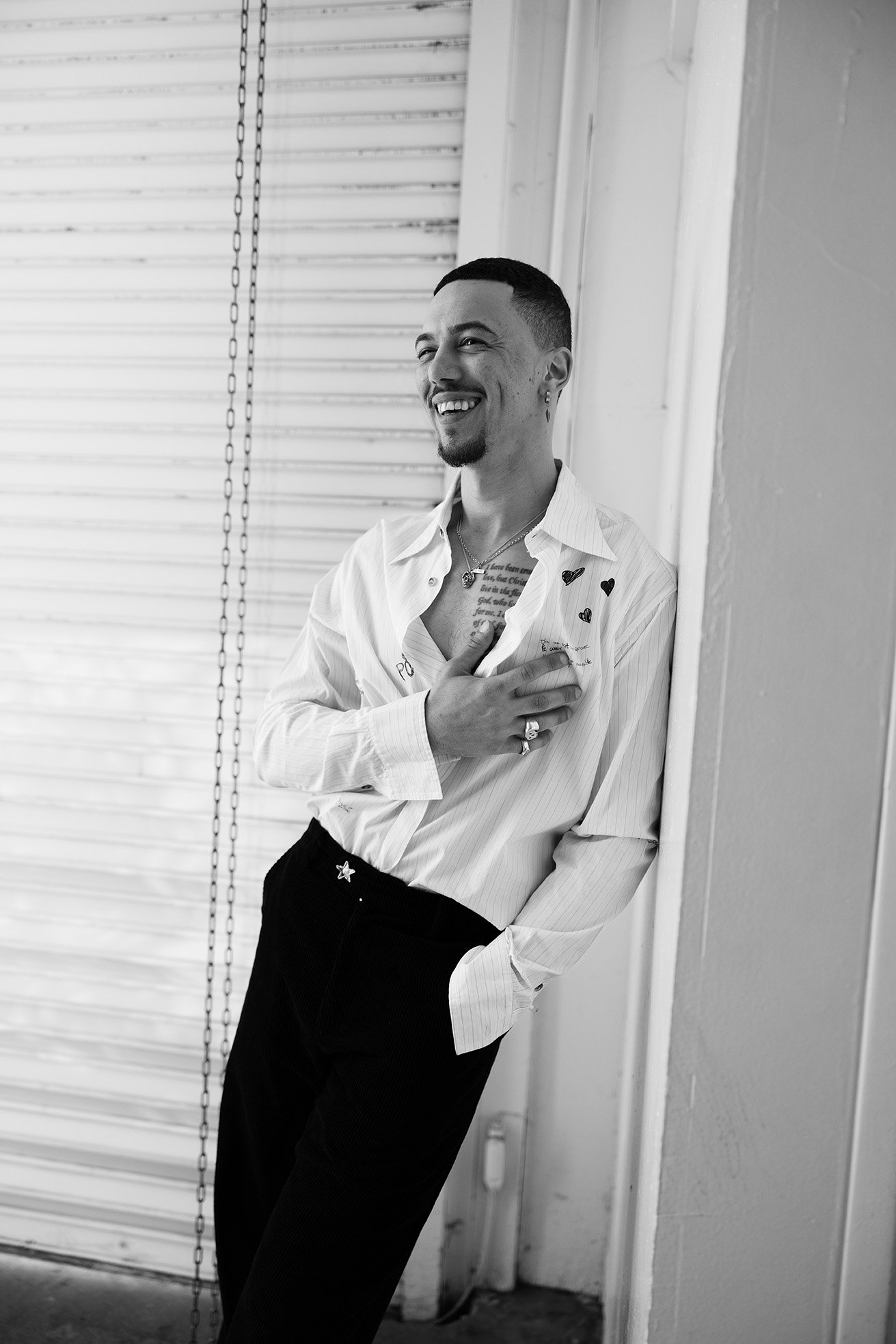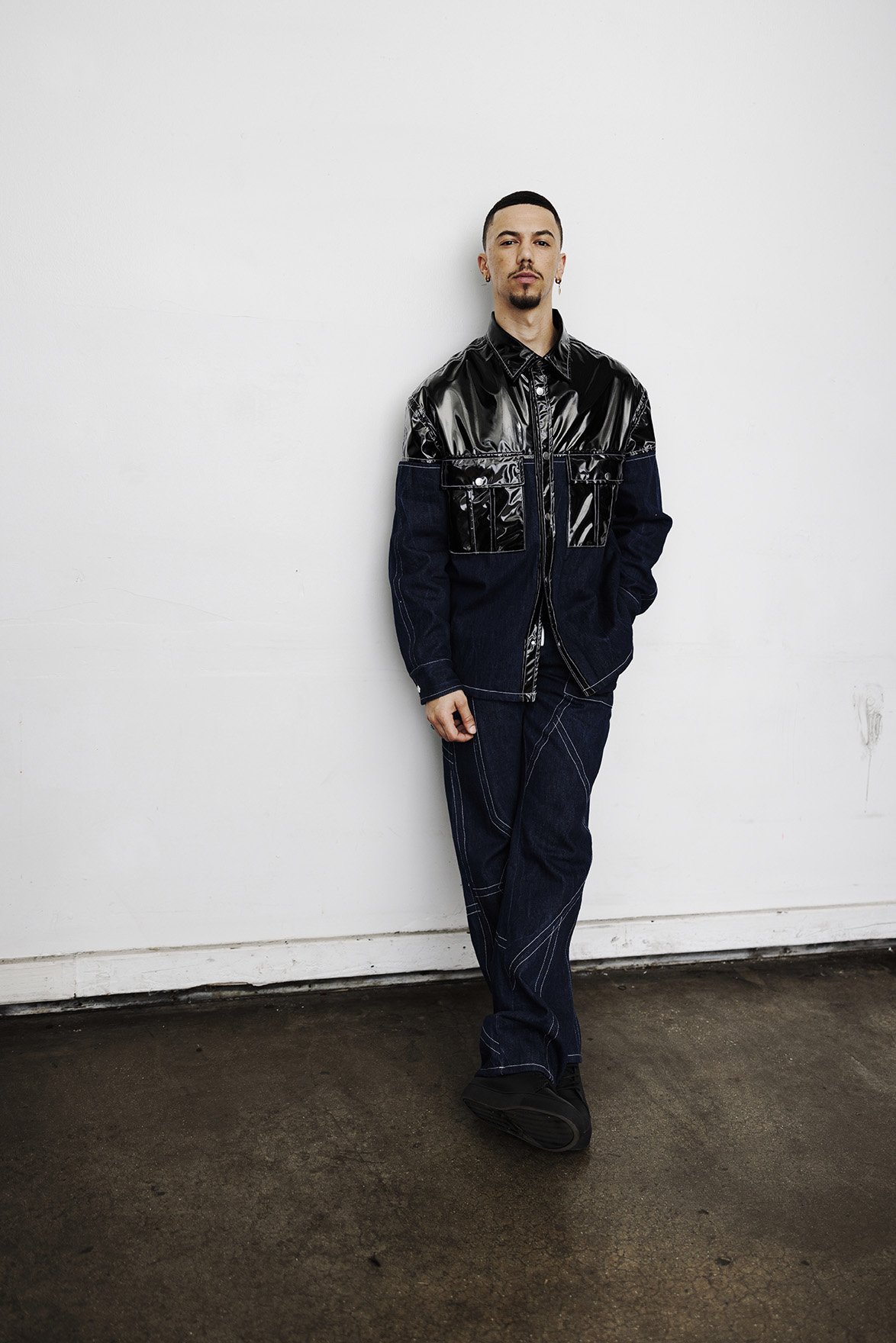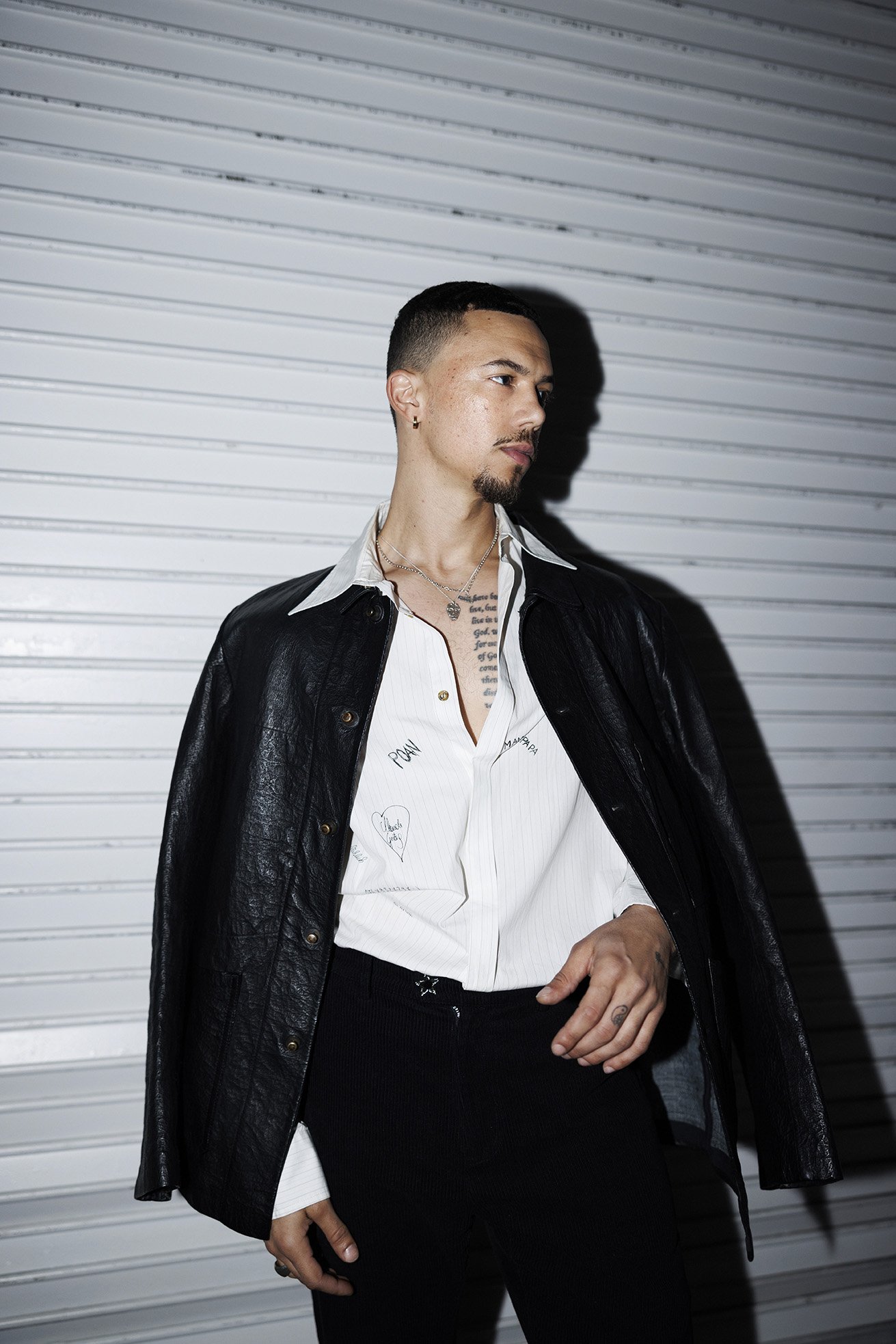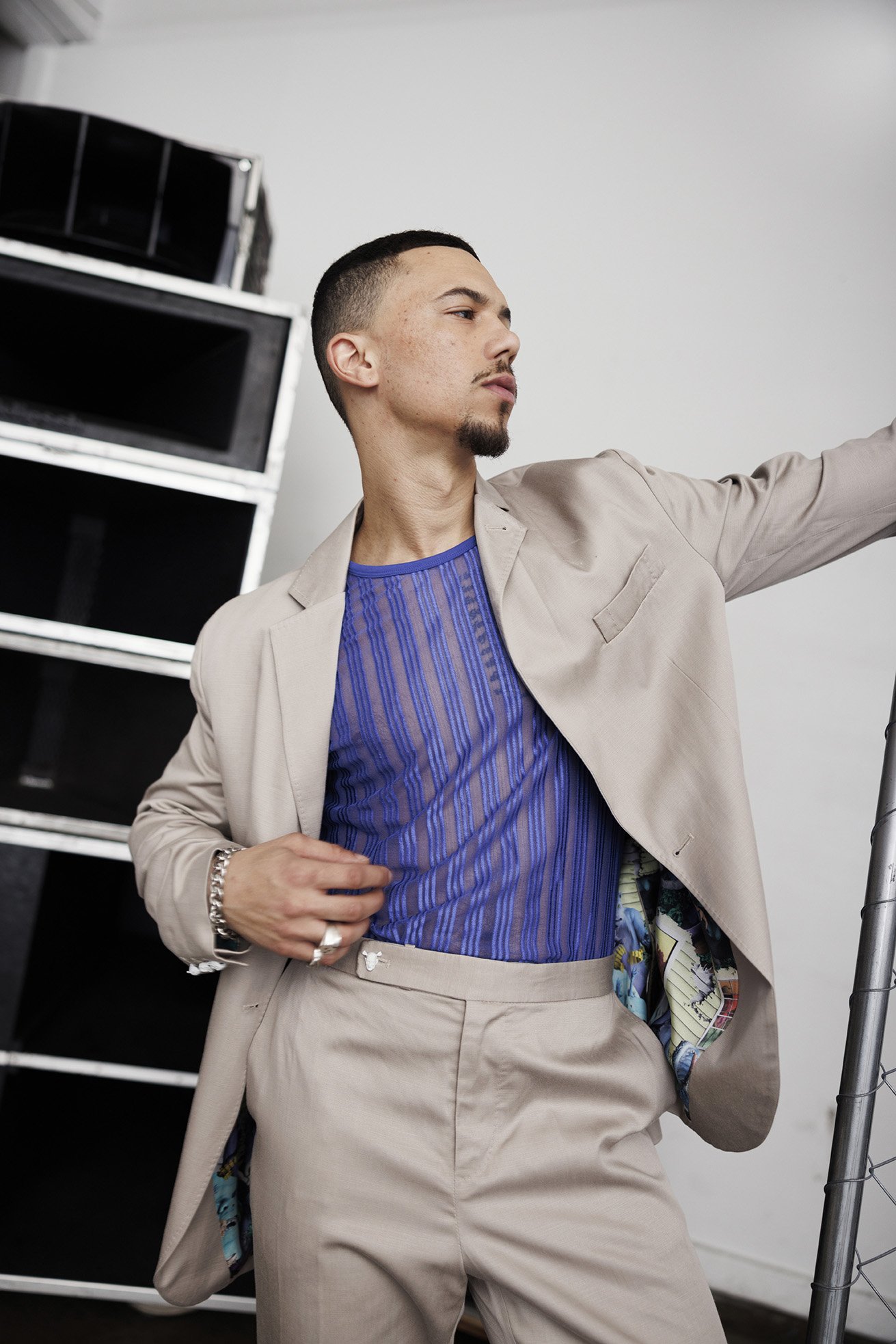Dominique Columbus
Interview & Photography by Nolwen Cifuentes
Styling by Georgie Stuart @ The Rex Agency
Grooming by Colleen Dominique @ Exclusive Artists using Tower 28 and Circa 1970
Photo Assisting by Stephen Goldstein
In the world of remakes and reboots, it takes a special blend of reverence and innovation to breathe new life into a cult classic. Enter Road House, a modern reinterpretation of the Patrick Swayze action staple that has captivated audiences with its blend of martial arts and barroom brawls. The latest iteration stars Jake Gyllenhaal in the lead role, stepping into the shoes once filled by Swayze, and introduces audiences to the adrenaline-fueled world of the titular roadside bar. Among the fresh faces is Dominique Columbus, playing the role of Reef, a character defined by his strength, competitiveness, and unique camaraderie with Dalton (played by Gyllenhaal) and Billy (Lukas Gage).
Growing up watching the action figures of the '90s and earlier, and with an extensive background in boxing, Columbus felt a personal connection to the project. Columbus's dedication was matched by his preparation; he entered the project on the heels of an intense physical transformation, aiming to bring his A-game to a film that demanded nothing less, especially with a fight scene against UFC champion Conor McGregor.
We got to chat with Dominique and talk about his experience on the film, his background in boxing, and his passion for storytelling.
Full Look VIRGIL VIRGIL Shoes THURSDAYS BOOTS
Let's talk about Road House! First of all, have you seen the original one?
I was definitely a fan for sure. I grew up in a household where my dad was a big fan of the movie. Road House, The Warriors, all those classics, anything action-based in the '90s or earlier, my dad had me on game about. The scene with Patrick Swayze ripping out that dude’s throat was such an iconic thing. Being part of the IP and being part of this now is amazing. We just got news today that it's now the most watched movie worldwide on Amazon that they've ever released. We just broke all the records today. That's more gratitude that I'm feeling to be a part of something so iconic on that level.
That’s amazing! Congrats on that win. So I know you’re an athletic guy, you’ve been boxing most of your life. What was the training for this film like especially with your background?
A year prior to booking this, I had set a goal to put on twenty pounds of muscle on my body. My girl was my trainer, she was my nutritionist, she did all my meal preps and stuff. I already had this set goal of enhancing my body and enhancing my athleticism to another level. When the year passed by and I got the opportunity for Road House, I already felt I was in full motion. So in terms of my training, in terms of all sides of athleticism, boxing, everything, I was ready to go. I wanted to be on top of my A-game for whatever they needed me to do. In terms of a lot of things I would do boxing-wise, I made sure I was sharp, my movements, everything. I was ready to go, especially knowing I had a fight with Conor McGregor.
Were you a fan of Conor McGregor before this?
I have a ticket that from the Floyd Mayweather and Conor McGregor fight when they fought. My dad and I sat in the front row at that fight. I remember watching, I was a Floyd Mayweather fan, but I was like, I got so much respect for Connor being the first UFC fighter to come over here, have this debut, fight a boxer. Him and Floyd, I really feel elevated and changed the game. And if you look at Connor's trajectory, one thing that inspires me is he keeps breaking records. He's the highest paid UFC fighter, the highest paid debut in boxing, and now he’s got this debut in acting. This guy is just breaking these records over and over, and it's not by accident. Does that inspire me? 100%.
And you had a fight scene with him. I think he beats you up from what I remember. What was that like?
He slammed my head on the table, gave your boy a little gash [Laughs]. But no, it was fun. We were just in this process of even trying to figure out what that dance was and what worked and what didn’t.
Jacket & Pants NO OTRA Vest THE HIDEOUT CLOTHING Shoes THURSDAYS BOOTS Rings RAT BETTY
This film used a unique camera technique, the four-pass process, where you’d shoot four different versions of the hits and then stitch them together. What was it like rehearsing for fight scenes like that?
Well, what was cool on my side of things, was working a lot with Steve Brown [Road House fight/stunt coordinator] on grappling. You have Garrett [Warren, Road House stunt coordinator], you have Steve, and you have the rest of the team. But when I worked with Steve, we were doing a lot more grappling work because me and Lukas Gage's character, we're throwing people off the bar a lot. We're grabbing people's heads a lot, throwing them out. When I had my moment with McGregor, it was actually one of the times we didn’t do the four-pass shot because Connor was like “have a couple of them hit my abs.” But watching Jake and watching everybody else on set when they're doing that shot sequence, it's really crazy to see how it all blends together. You have a first take, they sell it. The second one, he hits the pad. And now the third one, it’s slow motion. And then what they do is to all compile it to one shot so it can look like it's an in the moment situation.
Me and Connor, though, we were just like, let's go. I took a shot from Connor on one of his takes on set on an accident. We're on take seven or eight at this point. In the moment, he ends up catching me with his elbow on accident. He's like, “Oh, I'm so sorry.” I was like, “No, keep going.” When that happens, keep it going, we were just having so much fun with it. It was just like a high energy situation.
Everybody's going to catch one. It comes with the stunts. But it's fun. We laugh about it.
Shirt POAN Pants PYTHIA Jacket ISAAC SELLAM Boots THURSDAYS BOOTS Bracelet KNOTWTR Necklaces & Rings RAT BETTY
Talk to me about growing up, you boxed at a young age and your dad was your boxing coach.
Everybody in my family is blessed to do things at high levels. My dad was the first one in history to create a program called KO High. We're out here in California with other high schools, we box other high schools, just like they compete in basketball, football, and baseball. He had this program running for over 10 to 15 years, had thousands of students come through his program and graduate. I grew up in that from a very young age. I started learning how to box from the age of 11 years old. My dad was definitely a big inspiration in terms of the boxing side of things and getting to that realm. I always knew that I wanted to translate into acting and film. That's what I wanted to do after high school.
Suit BOURBON SUMMER CARTOON CRISIS Vest CODE 22 Rings RAT BETTY
Yeah, so you actually turned down several athletic scholarships to attend the LA Film School. What made you decide to that?
I didn't see myself going to a four-year university. I felt like I would have flunked out, partying too much, honestly. I decided to go to a community college for a year. I went to COC, College of Canada, Valencia. I majored in theater because I wanted to get into it. And while I was doing that, I was studying at Meisner. My dad sat me down one day. It's funny how my dad ended up being the person again. But he sat me down one day, he was like, “Dom, I know you want to be an actor, but I think you should check out this film school because you don't want to have to just keep auditioning for the rest of your life. You want to be in a position where you can create and produce. You want to write your own projects because you're creative and you want to tell stories, not always wait for other people to give you a job.” I checked out the film school and I fell in love.
It was an 18 month program. And they don't party like that. You get in and you lock in. You're in school every day from morning til night. That process taught me everything that I wanted to do in terms of the film side — directing, writing, producing. Now, fast forward, I'm doing this with my own production teams, my own crews. My friends and I shoot our own projects. We do whatever we want to do.
Pants ALEXANDER MCQUEEN Vest BARELY BROKE
And now on top of your acting career, you’ve got a production company, a podcast, you wear lots of hats.
It's all in the same realm. Creativity, film, acting. Even if I'm doing a podcast, the concept of having to still set up these episodes, get my guests, understand what I'm talking about, what's the intention. I'm always within the realm of creativity.
I like to label it “storytellers.” You're doing a magazine, you're doing interviews, you’re taking photos, you're telling somebody's story. If I'm doing a podcast, I'm telling somebody's story. If you're able to storytell authentically in photography, podcasts, or now screenwriting, they're all different forms of storytelling. It's just understanding what's your best outlet.
I imagine with a job like acting, you’re kind of in a limbo of going from one audition to the next, waiting for something to happen.
I think about last year, we had a massive strike. People are sitting there. It sucks. On the acting side, we can't do anything because we have to support our union. But when you go a year with no work, for me, luckily, I have a podcast I can create. I can still create meetings with my friends, and we can start working on scripts, start working on ideas. When the strike was lifted, we had shit ready to go. It’s a way that we're able to still keep busy and still keep creating versus being like, damn, my agent, my manager… there's no auditions.
Talk to me more about your podcast.
The podcast is called Inspire to Inspire. I created this jacket back in high school and painted this really dope logo on it — I ended up using for the podcast. A lot of times people are like, “Well, why not Aspire to Inspire?” Because there's a slogan that was Aspire to Inspire. I'm like, bro, I'm not aspiring to be inspirational. I'm already inspirational. And at that time, in high school, I knew that for myself because what I was doing on the athletic level in the sports was inspiring my younger cousins, my younger family to do what they wanted to do at a high level and do it to the best of their ability. So fast forward, now I'm like, the podcast, I'm going to call it Inspire to Inspire because at the end of the day, I'm bringing on these guests to go and share their stories, and we're going to speed up these other people's learning curves.
My main focus is still working on movies and TV shows, and then I have my own production company. My best friend and I just finished up our short film, Street Code. It's about two LAPD officers who deal with a domestic violence call and it goes left. It's action-based. A lot of what I'm creating right now when I'm working on, is to just showcase what me and my team can do. We're ready to have our own shows get picked up, our own movies get picked up, on top of everything I'm doing as an actor.
I love that you’re creating your own work, you’re not waiting around for the phone to ring. It also sounds like in this short, you get to incorporate your boxing background, is that right?
After I shot Road House, we already had this thing in the works. I learned a lot from Garrett Warren and Steve Brown, this is what I wanted to implement into this project. My best friend's name is Reggie Lucket. We co-directed it, we co-wrote it, co-produced it, and we starred in it.
It's not out yet, because we have a lot of momentum on what we want to do with the whole entire project. We have an anthology series, so this will essentially be the pilot for our series. It's like End of Watch meets The Raid: Redemption. I don't know if you've ever seen End of Watch, it’s with Jake Gyllenhaal as well, where he plays a cop, and they're just in raw situations. You’re watching these officers, and what they're going through, what they're dealing with. That's where a lot of the inspiration came from, which is ironic that I ended up working with Jake.
It was one of my favorite movies growing up. I feel like this is the narrative of my career so far. All my favorite actors, I've been blessed to work with them so far.
✦















